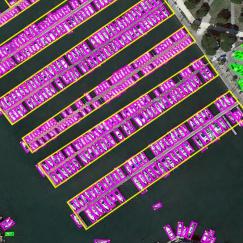Search Results for author: Xiaojiang Yang
Found 5 papers, 2 papers with code
Detecting Rotated Objects as Gaussian Distributions and Its 3-D Generalization
1 code implementation • 22 Sep 2022 • Xue Yang, Gefan Zhang, Xiaojiang Yang, Yue Zhou, Wentao Wang, Jin Tang, Tao He, Junchi Yan
Existing detection methods commonly use a parameterized bounding box (BBox) to model and detect (horizontal) objects and an additional rotation angle parameter is used for rotated objects.
Nonlinear ICA Using Volume-Preserving Transformations
no code implementations • ICLR 2022 • Xiaojiang Yang, Yi Wang, Jiacheng Sun, Xing Zhang, Shifeng Zhang, Zhenguo Li, Junchi Yan
Nonlinear ICA is a fundamental problem in machine learning, aiming to identify the underlying independent components (sources) from data which is assumed to be a nonlinear function (mixing function) of these sources.
Learning High-Precision Bounding Box for Rotated Object Detection via Kullback-Leibler Divergence
2 code implementations • NeurIPS 2021 • Xue Yang, Xiaojiang Yang, Jirui Yang, Qi Ming, Wentao Wang, Qi Tian, Junchi Yan
Taking the perspective that horizontal detection is a special case for rotated object detection, in this paper, we are motivated to change the design of rotation regression loss from induction paradigm to deduction methodology, in terms of the relation between rotation and horizontal detection.
 Ranked #14 on
Object Detection In Aerial Images
on DOTA
(using extra training data)
Ranked #14 on
Object Detection In Aerial Images
on DOTA
(using extra training data)
Self-supervised Disentangled Representation Learning
no code implementations • 1 Jan 2021 • Xiaojiang Yang, Yitong Sun, Junchi Yan
In our experiments, we find that even the data is only augmented along a few latent variables, more latent variables can be identified, and adding a small noise in data space can stabilize this outcome.
Towards Better Understanding of Disentangled Representations via Mutual Information
no code implementations • 25 Nov 2019 • Xiaojiang Yang, Wendong Bi, Yitong Sun, Yu Cheng, Junchi Yan
Most existing works on disentangled representation learning are solely built upon an marginal independence assumption: all factors in disentangled representations should be statistically independent.


